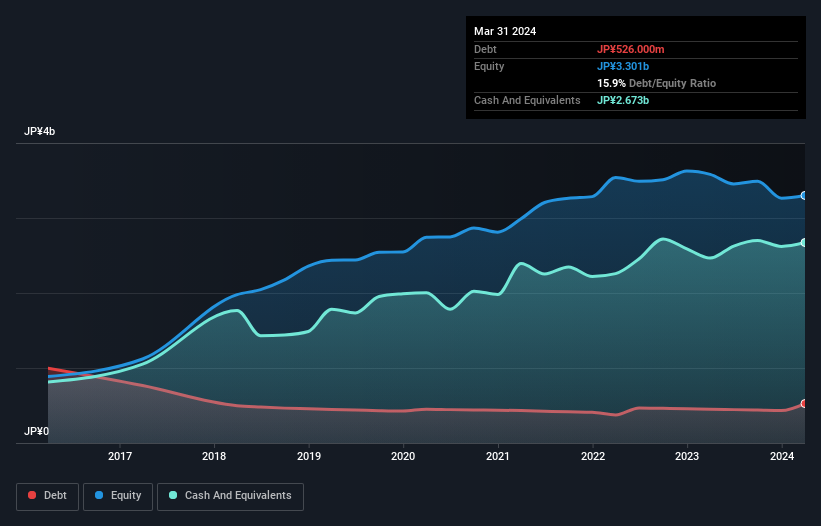- Japan
- /
- Electronic Equipment and Components
- /
- TSE:6698
Is ViSCO Technologies (TSE:6698) Using Debt In A Risky Way?
Warren Buffett famously said, 'Volatility is far from synonymous with risk.' So it might be obvious that you need to consider debt, when you think about how risky any given stock is, because too much debt can sink a company. We can see that ViSCO Technologies Corporation (TSE:6698) does use debt in its business. But should shareholders be worried about its use of debt?
When Is Debt Dangerous?
Debt and other liabilities become risky for a business when it cannot easily fulfill those obligations, either with free cash flow or by raising capital at an attractive price. Ultimately, if the company can't fulfill its legal obligations to repay debt, shareholders could walk away with nothing. While that is not too common, we often do see indebted companies permanently diluting shareholders because lenders force them to raise capital at a distressed price. Of course, the upside of debt is that it often represents cheap capital, especially when it replaces dilution in a company with the ability to reinvest at high rates of return. When we think about a company's use of debt, we first look at cash and debt together.
See our latest analysis for ViSCO Technologies
How Much Debt Does ViSCO Technologies Carry?
The image below, which you can click on for greater detail, shows that at March 2024 ViSCO Technologies had debt of JP¥526.0m, up from JP¥451.0m in one year. But it also has JP¥2.67b in cash to offset that, meaning it has JP¥2.15b net cash.

How Healthy Is ViSCO Technologies' Balance Sheet?
Zooming in on the latest balance sheet data, we can see that ViSCO Technologies had liabilities of JP¥921.0m due within 12 months and liabilities of JP¥315.0m due beyond that. Offsetting these obligations, it had cash of JP¥2.67b as well as receivables valued at JP¥959.0m due within 12 months. So it can boast JP¥2.40b more liquid assets than total liabilities.
This surplus liquidity suggests that ViSCO Technologies' balance sheet could take a hit just as well as Homer Simpson's head can take a punch. On this view, lenders should feel as safe as the beloved of a black-belt karate master. Simply put, the fact that ViSCO Technologies has more cash than debt is arguably a good indication that it can manage its debt safely. There's no doubt that we learn most about debt from the balance sheet. But it is ViSCO Technologies's earnings that will influence how the balance sheet holds up in the future. So when considering debt, it's definitely worth looking at the earnings trend. Click here for an interactive snapshot.
In the last year ViSCO Technologies had a loss before interest and tax, and actually shrunk its revenue by 9.1%, to JP¥3.2b. That's not what we would hope to see.
So How Risky Is ViSCO Technologies?
Although ViSCO Technologies had an earnings before interest and tax (EBIT) loss over the last twelve months, it generated positive free cash flow of JP¥270m. So although it is loss-making, it doesn't seem to have too much near-term balance sheet risk, keeping in mind the net cash. The next few years will be important as the business matures. When analysing debt levels, the balance sheet is the obvious place to start. However, not all investment risk resides within the balance sheet - far from it. For example, we've discovered 2 warning signs for ViSCO Technologies (1 is a bit unpleasant!) that you should be aware of before investing here.
Of course, if you're the type of investor who prefers buying stocks without the burden of debt, then don't hesitate to discover our exclusive list of net cash growth stocks, today.
New: Manage All Your Stock Portfolios in One Place
We've created the ultimate portfolio companion for stock investors, and it's free.
• Connect an unlimited number of Portfolios and see your total in one currency
• Be alerted to new Warning Signs or Risks via email or mobile
• Track the Fair Value of your stocks
Have feedback on this article? Concerned about the content? Get in touch with us directly. Alternatively, email editorial-team (at) simplywallst.com.
This article by Simply Wall St is general in nature. We provide commentary based on historical data and analyst forecasts only using an unbiased methodology and our articles are not intended to be financial advice. It does not constitute a recommendation to buy or sell any stock, and does not take account of your objectives, or your financial situation. We aim to bring you long-term focused analysis driven by fundamental data. Note that our analysis may not factor in the latest price-sensitive company announcements or qualitative material. Simply Wall St has no position in any stocks mentioned.
Have feedback on this article? Concerned about the content? Get in touch with us directly. Alternatively, email editorial-team@simplywallst.com
About TSE:6698
ViSCO Technologies
Engages in the development, manufacture, sale, and maintenance of machine vision systems in Japan and internationally.
Flawless balance sheet very low.
Market Insights
Weekly Picks

THE KINGDOM OF BROWN GOODS: WHY MGPI IS BEING CRUSHED BY INVENTORY & PRIMED FOR RESURRECTION


Why Vertical Aerospace (NYSE: EVTL) is Worth Possibly Over 13x its Current Price


The Quiet Giant That Became AI’s Power Grid
Recently Updated Narratives


Mastersystem Infotama will achieve 18.9% revenue growth as fair value hits IDR1,650


Insiders Sell, Investors Watch: What’s Going On at PG?

Waiting for the Inevitable
Popular Narratives


MicroVision will explode future revenue by 380.37% with a vision towards success


NVDA: Expanding AI Demand Will Drive Major Data Center Investments Through 2026


Crazy Undervalued 42 Baggers Silver Play (Active & Running Mine)
Trending Discussion




